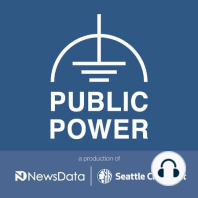51 min listen
Fish Risk!
ratings:
Length:
63 minutes
Released:
Sep 30, 2021
Format:
Podcast episode
Description
It’s season 3, episode 4 - Fish Risk! week for Public Power Underground. We cover everything from permafrost to Dolly Parton on this week’s episode hosted a combination of new stars (Ludgie Gelin and Betsy Bridge), returning star (Arin Guillory), and regular co-host (Paul Dockery). The highlight is a wonderful interview with the Director of BPA’s Fish & Wildlife Program, Crystal Ball, where we try to better understand fish risk for preference customer considering a post-2028 contract with BPA. We also get a visit from Special Correspondent, and star of the Underground, Matt Schroettnig. The whole thing is wonderful.
04:05 - Arin Reports
07:38 - Three news releases from BPA
10:42 - safe, small, TRANSPORTABLE nuclear reactor
12:24 - Oregon Solar Program update
17:52 - Matt Schroettnig appears as Special Guest Correspondent to talk about submarine supergrids
27:34 - Portland General Electric topic that is very-accountant-nerdy
29:18 - The Cold Climate Housing Research Center is designing Alaskan housing for a future of changing climate
33:40 - Crystal Ball, the Director of BPA's Fish & Wildlife Program, helps clarify fish risk for preference customers considering a post-2028 contract with BPA
56:42 - Dispatches from #energytwitter starring Dolly Parton, Ted Lasso, and #HotFERCSummer
Public Power Underground, for electric utility enthusiasts! Public Power Underground, it’s work to watch!
04:05 - Arin Reports
07:38 - Three news releases from BPA
10:42 - safe, small, TRANSPORTABLE nuclear reactor
12:24 - Oregon Solar Program update
17:52 - Matt Schroettnig appears as Special Guest Correspondent to talk about submarine supergrids
27:34 - Portland General Electric topic that is very-accountant-nerdy
29:18 - The Cold Climate Housing Research Center is designing Alaskan housing for a future of changing climate
33:40 - Crystal Ball, the Director of BPA's Fish & Wildlife Program, helps clarify fish risk for preference customers considering a post-2028 contract with BPA
56:42 - Dispatches from #energytwitter starring Dolly Parton, Ted Lasso, and #HotFERCSummer
Public Power Underground, for electric utility enthusiasts! Public Power Underground, it’s work to watch!
Released:
Sep 30, 2021
Format:
Podcast episode
Titles in the series (100)
Bonus Episode: The Scourge of Seasonal Time Change: In a special, bonus, episode the Underground tackles The Scourge of Seasonal Time Change. Joining the Underground to tackle the issue is the Executive Director of the Pacific Northwest Utilities Conference Committee (PNUCC), Shauna McReynolds, the Power R by Public Power Underground
